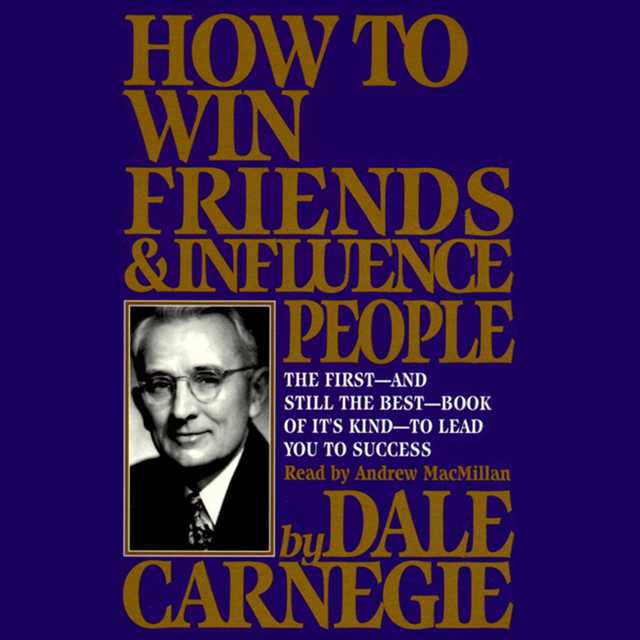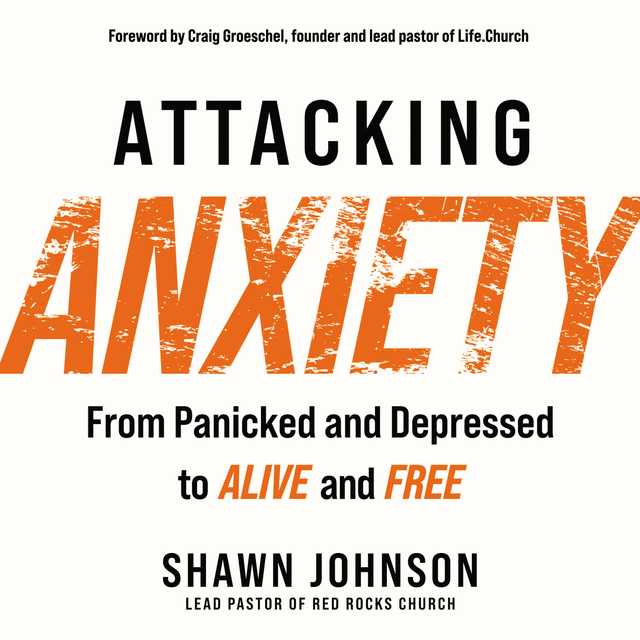Recommended by 4 experts
How To Win Friends And Influence People Audiobook Summary
Updated for today’s readers, Dale Carnegie’s timeless bestseller How to Win Friends and Influence People is a classic that has improved and transformed the professional and personal and lives of millions.
One of the best-known motivational guides in history, Dale Carnegie’s groundbreaking book has sold tens of millions of copies, been translated into almost every known language, and has helped countless people succeed.
Originally published during the depths of the Great Depression—and equally valuable during booming economies or hard times—Carnegie’s rock-solid, time-tested advice has carried countless people up the ladder of success in their professional and personal lives.
How to Win Friends and Influence People teaches you:
-How to communicate effectively
-How to make people like you
-How to increase your ability to get things done
-How to get others to see your side
-How to become a more effective leader
-How to successfully navigate almost any social situation
-And so much more!
Achieve your maximum potential with this updated version of a classic—a must-read for the 21st century.
Other Top Audiobooks
How To Win Friends And Influence People Audiobook Narrator
Andrew Macmillan is the narrator of How To Win Friends And Influence People audiobook that was written by Dale Carnegie
About the Author(s) of How To Win Friends And Influence People
Dale Carnegie is the author of How To Win Friends And Influence People
More From the Same
- Publisher : Simon & Schuster Audio
- The Fourth Mega Market
- Nothing Like it In The World
- Fatal Voyage
- The Good German
- The Victors
How To Win Friends And Influence People Full Details
| Narrator | Andrew Macmillan |
| Length | 7 hours 18 minutes |
| Author | Dale Carnegie |
| Publisher | Simon & Schuster Audio |
| Release date | April 12, 1998 |
| ISBN | 9780743544719 |
Subjects
The publisher of the How To Win Friends And Influence People is Simon & Schuster Audio. includes the following subjects: The BISAC Subject Code is Psychology, Interpersonal Relations
Additional info
The publisher of the How To Win Friends And Influence People is Simon & Schuster Audio. The imprint is Simon & Schuster Audio. It is supplied by Simon & Schuster Audio. The ISBN-13 is 9780743544719.
Global Availability
This book is only available in the United States.
How To Win Friends And Influence People is recommended by
Warren Buffett
Warren Edward Buffett is a business magnate, investor, and philanthropist.
In my office, you will not see the degree I have from the University of Nebraska, or the master’s degree I have from Columbia University, but you’ll see the certificate I got from the Dale Carnegie course.
Dave Ramsey
David Lawrence Ramsey III is a personal finance personality, radio show host, author,& businessman.
Recommends this book
Paul Graham
Paul Graham is a computer scientist, essayist, entrepreneur, venture capitalist, & author.
The one book we encourage startup founders to read. [...] It's critically important for anyone in business.
Patrick Bet-David
Patrick Bet-David is WSJ # 1 Best Seller & founder of Valuetainment. He mentors leaders and entrepreuners.
Recommends this book
Goodreads Reviews
Ivan
September 27, 2007
Three things about this book surprised me and I liked it a lot more than I thought I would. One - it seemed pretty much timeless. Not much anachronism here, because language still serves the same purposes as ever, and people still want basically the same things they've always wanted. I liked the examples taken from Abe Lincoln, etc.Two - the techniques described in the book aren't duplicitous. We all try to do what the title says, just like everyone else, whether we're admitting it to ourselves or not. Readers are repeatedly encouraged to develop genuine interest in others, be honest and ethical, and obey the golden rule.Three - I enjoyed it (read twice back to back) and it felt easy and natural to apply some of the ideas in my life. Shortly after reading this book, I was a little bit better at communicating and a little bit happier about my interactions with others in general.
Ahmad
December 07, 2021
How to Win Friends and Influence People, Dale CarnegieHow to Win Friends and Influence People is a self-help book written by Dale Carnegie, published in 1936. Over 15 million copies have been sold worldwide, making it one of the best-selling books of all time. In 2011, it was number 19 on Time Magazine's list of the 100 most influential books. تاریخ نخستین خوانش: سال1968میلادیعنوان: آیین دوست یابی؛ نویسنده: دیل کارنگی؛ موضوع نوشتارهای نویسندگان ایالات متحده آمریکا - سده20مراهکارهای بسیار ساده ای، که به کار بردن آن راهکارها، تاثیر بسیاری در بهبود روابط اجتماعی خواهد داشت را به خوانشگر معرفی میکند؛کتاب «آئین دوستیابی» یا عنوان اصلی: «چگونه میتوان دوست یافت و در مردم نفوذ کرد»؛ کتابی در سبک «یاری به خویشتن» نوشته ی «دیل کارنِگی» است؛ این کتاب یکی از نخستین، و بهترین کتابهای «یاری به خویشتن» است، نخستین چاپ این کتاب در سال1936میلادی بوده است؛مترجمان بزرگوار بسیاری خانمها و آقایان «رشید یاسمی با نام غلامرضا رشید یاسمی در سال1320هجری خورشیدی، در336ص؛ چاپ هفتم سال1333هجری خورشیدی»، «مهناز بهرنگی»؛ «محسن علیمددی»، «ریحانه جعفری»، «پروین قائمی»؛ «هانیه حقنبیمطلق»؛ «خشایار خطیر»؛ «جهانگیر افخمی»؛ «اردلان افخمی»؛ «عفت غفوری»؛ «سمیرا شاهمرادی»؛ «سودابه مبشر»؛ «ساناز توتونچی»؛ «سوزان خدیو»؛ «مرضیه صادقیزاده»؛ «کبری قیصری»؛ «محمد محمدی»؛ «سیدحسن حسینی»؛ «زینب بهاری»، «زینب غیوریکودهی»؛ «آذر محزون»؛ «مهرداد مهرین»؛ «محمود دوستدار»؛ «میترا کیوانمهر»؛ «سیروس عظیمی»؛ «نادر تسلیمیان»؛ «فرشته پرنیانخوی»؛ «فرانک جهانبخش»؛ «محمدرضا اکبریبیرقی»؛ «سامیه ابوالفتحی»؛ «سیروس عظیمی»؛ و ...؛ تا کنون کتاب را به فارسی برگردان کرده اند، که بیشتر آنها همین عنوان کوتاه: «آئین دوست یابی» را برای کتاب برگزیده اندکتاب «کارنگی» در شش بخش است؛ نخستین بخش «اصول اساسی رفتار با مردم» نام دارد؛ این بخش از سه فصل اصلی تشکیل شده است که «دیل کارنگی» در هر کدام توضیحاتی جامع درباره ی رفتارهای متقابل انسانها میدهندبخش دوم شش راه برای کسب محبوبیت نام دارد؛ این بخش که شش فصل دارد، روشهای جلب محبت دیگران را بیان میکند؛ این فصل از نظر خوانشگران بهترین فصل کتاب است، راهکارهای بسیار جالب و کارآمد دارد که شما میتوانید در زندگی روزمره خود از آنها سود ببرید؛ «دیل کارنگی» در آخرین فصل این بخش نکته ای را یادآوری میکند، که شاید این روزها فراموش شده باشند؛ ایشان میگویند: «صمیمانه و صادقانه کاری کنید که دیگری احساس مهم بودن کند»؛ «کارنگی» برای اثبات این نظریه، روایتی از «دیزرائیلی»، یکی از نخست وزیران پیشین «انگلستان»، بازگو میکند که امپراطور، در تنها یک جمله میگوید: «با هر کس درباره ی خودش حرف بزنید؛ ساعتها به حرفهای شما گوش میدهد.»؛بخش سوم «دوازده شیوه برای آنکه دیگران را با خود همراه سازید» نام دارد، و در دوازده فصل روایت میشود؛ «دیل کارنگی» تأثیر رقابت مثبت را در این بخش بیان میکند؛ داستانی از کارخانه ی ذوب آهن بیان میکنند که رقابت مثبت بین کارمندان شیفت صبح و شب باعث شد که آن کارخانه از ورشکستگی نجات پیدا کندبخش چهارم این کتاب، در نه فصل، «نه روش برای همراه ساختن دیگران با خود بدون آنکه رنجیده خاطر یا خشمگین شوند» را شرح میدهد؛ «کارنگی» مخالف شدید انتقاد است، اما در فصل اول این بخش از کتاب میگویند: «اگر ضرورت دارد که از کسی انتقاد کنید اینطور شروع کنید؛ ابتدا از او تعریف و تمجید کنید و سپس از او انتقاد کنید؛ این روش باعث میشود که انتقاد برای انتقاد شونده آنقدر تلخ و دردناک نباشد»؛بخش پنجم این کتاب، «چند نامه ی معجزه آمیز» است که در آن «دیل کارنگی»، نامه هایی را در این بخش نگاشته اند تا خوانشگرانش بتوانند تغییرات ایجاد شده در روابط را حس کنندبخش ششم و پایانی کتاب «هفت توصیه ی مهم برای نیکبختی اعضای خانواده» نام دارد؛ این بخش که هفت فصل دارد، نخست مشکلات زندگی زناشویی را بررسی میکند و سپس راهکارها را ارائه میدهدنقل از متن: (آرزوی مهم بودن و مورد احترام دیگران قرار داشتن یکی از تفاوتهای مهم انسان با حیوانات است؛ البته احساس برتر بودن نیز در حیوانات وجود دارد، ولی ماهیت آن با آنچه در انسان است تفاوت دارد؛ برای اینکه بهتر متوجه قضیه شوید خاطره ای را برایتان تعریف کنم؛ وقتی یک پسربچه روستایی در ایالت میسوری بودم، پدرم به کار پرورش بز و گاو مشغول بود؛ ما گاوهای پیشانی سفید خود را، در نمایشگاههای روستایی دام، در سراسر غرب به نمایش میگذاشتیم، و چند بار هم جایزه ی اول را تصاحب کردیم؛ پدرم مدالهای آبی رنگ را روی پارچه ی اطلس سفیدی چسپانده بود، و هر بار که دوستان به خانه ی ما میآمدند، این پارچه را بیرون میآورد، و یک سرش را خودش میگرفت، و سر دیگرش را به دست من میداد، و مدالها آبی را به مهمانان نشان میدادیمدرآن دوران گاوها اهمیتی به جایزه ای که به دست آورده بودند نمیدادند، ولی پدرم خیلی به آنها اهمیت میداد، چون بدون شک اگر این عطش سیری ناپذیر برای مهم بودن، و مورد تحسین دیگران قرار گرفتن، در میان انسانها وجود نداشت، تمدنی با این افتخارات چشمگیر بوجود نمیآمد؛ بدون این حس، ما نیز همانند سایر موجودات بودیمهمین عطش مهم بودن، و مورد ستایش قرار گرفتن بود، که باعث شد یک پادوی بیسواد و فقیر خواروبار فروشی، به مطالعه ی برخی کتب حقوقی، که در ته یک بشکه ی کهنه پیدا کرده، و به مبلغ پنجاه سنت خریداری کرده بود، بپردازد؛ شاید شما هم نام این پادوی خواروبار فروشی را شنیده باشید؛ بله اسمش «آبراهام لینکلن» است)؛ پایان نقلتاریخ بهنگام رسانی 18/10/1399هجری خورشیدی؛ 16/09/1400هجری خورشیدی؛ ا. شربیانی
Roy
February 22, 2017
When dealing with people, let us remember we are not dealing with creatures of logic. We are dealing with creatures of emotion, creatures bristling with prejudices and motivated by pride and vanity. Dale Carnegie is a quintessentially American type. He is like George F. Babbitt come to life—except considerably smarter. And here he presents us with the Bible for the American secular religion: capitalism with a smile. In a series of short chapters, Carnegie lays out a philosophy of human interaction. The tenets of this philosophy are very simple. People are selfish, prideful, and sensitive creatures. To get along with people you need to direct your actions towards their egos. To make people like you, compliment them, talk in terms of their wants, make them feel important, smile big, and remember their name. If you want to persuade somebody, don’t argue, and never contradict them; instead, be friendly, emphasize the things you agree on, get them to do most of the talking, and let them take credit for every bright idea. The most common criticism lodged at this book is that it teaches manipulation, not genuine friendship. Well, I agree that this book doesn’t teach how to achieve genuine intimacy with people. A real friendship requires some self-expression, and self-expression is not part of Carnegie’s system. As another reviewer points out, if you use this mindset to try to get real friends, you’ll end up in highly unsatisfying relationships. Good friends aren't like difficult customers; they are people you can argue with and vent to, people who you don't have to impress. Nevertheless, I think it’s not accurate to say that Carnegie is teaching manipulation. Manipulation is when you get somebody to do something against their own interests; but Carnegie’s whole system is directed towards getting others to see that their self-interest is aligned with yours. This is what I meant by calling him the prophet of “capitalism with a smile,” since his philosophy is built on the notion that, most of the time, people can do business with each other that is mutually beneficial. He never advocates being duplicitous: “Let me repeat: The principles taught in this book will work only when they come from the heart. I am not advocating a bag of tricks. I am talking about a new way of life.” Maybe what puts people off is his somewhat cynical view of human nature. He sees people as inherently selfish creatures who are obsessed with their own wants; egotists with a fragile sense of self-esteem: “People are not interested in you. They are not interested in me. They are interested in themselves—morning, noon and after dinner.” Well, maybe it's just because I am an American, but this conception of human nature feels quite accurate to me. Even the nicest people are absorbed with their own desires, troubles, and opinions. Indeed, the only reason that it’s easy to forget that other people are preoccupied with their own priorities is because we are so preoccupied with our own that it’s hard to imagine anyone thinks otherwise. The other day, for example, I ran into my neighbor, a wonderfully nice woman, who immediately proceeded to unload all her recent troubles on me while scarcely asking me a single question. This isn’t because she is bad or selfish, but because she’s human and wanted a listening ear. I don’t see anything wrong with it. In any case, I think this book is worth reading just for its historical value. As one of the first and most successful examples of the self-help genre, it is an illuminating document. Already in this book, we have what I call “Self-Help Miracle Stories”—you know, the stories about somebody applying the lessons from this book and achieving a complete life turnaround. Although the author always insists the stories are real, the effect is often comical: “Jim applied this lesson, and his customer was so happy he named his first-born son after him!” “Rebecca impressed her boss so much that he wrote her a check for one million dollars on the spot!” “Frank did such a good job at the meeting that one of his clients bought him a Ferrari, and another one offered him his daughter in marriage!” (These are only slight exaggerations.) Because of this book’s age, the writing is quaint and charming. Take, for example, this piece of advice on how to get the most out of the book: “Make a lively game out of your learning by offering some friend a dime or a dollar every time he or she catches you violating one of these principles.” A lively game! How utterly delightful.Probably this book would be far more effective if Carnegie included some exercises instead of focusing on anecdotes. But then again, it would be far less enjoyable reading in that case, since the anecdotes are told with such verve and pep (to quote Babbitt). And I think we could all use a little more pep in our lives.
Anne
June 27, 2022
There's actually some really great advice here that sort of stands the test of time. But like most self-help books, a lot of the advice doesn't work in every situation and/or is just flat-out situational. I also think the winning friends part of the book is less about having true friendships than about how to win over a room or how to convince people to see things your way. I wouldn't think that smiling and being agreeable, which is great on the surface and a good way to behave in general, would lend itself to creating strong intimate relationships. Everyone (whether they admit it or not) likes to see a bit of piss and vinegar in the personalities of their friends and lovers. My two favorite pieces of advice were these:Don't criticize, condemn, or complain. The author points out that when you humiliate someone their first instinct is to double down and try to prove that whatever they did or are doing is valid. It doesn't matter how right you are, the vast majority of people don't respond to criticism well at all. The only way to get the best of an argument is to avoid it.So true. Even if you win, you lose because that person will (once again) be humiliated and not be receptive to what you are trying to do. You may be completely right, but you're just shooting yourself in the dick by getting into an argument over things. You can smugly be right, or you can swallow that pride and choose to get things done. If you want results, try to put yourself in the other person's place and use a softer hand. No one likes to be embarrassed. Really the gist of everything this book talks about is just that you need to put yourself in the place of the person you need to win over. What do they want?
Ali
September 26, 2022
I really liked this book! I feel like I learned SO much about being a good leader, influencing people, and bettering my social skills. I truly think the lessons I learned in this book will stick with me for life. :)
Steven
May 02, 2022
¡Clásico de clásicos! Por la gran calidad del contenido, no es una sorpresa que, tras casi cien años de la fecha de publicación, el libro aún siga siendo vigente y muy popular.Excelente libro, en verdad me encanta. Esta obra de Carnegie me recuerda a un libro llamado 70 recetas para triunfar en la vida el cual mi madre me regaló hace varios años porque, en aquel entonces, ella, me sintió bastante desorientado en mi vida. Recuerdo que resultó siendo un gran regalo porque en verdad aquel libro me ayudó mucho para madurar, para ganar confianza, y para creer que todo lo que me proponga en el futuro puedo lograrlo, incluso si parece imposible. Enfrentarme a la vida real nunca fue sencillo para mí —de hecho aún tengo complicaciones para adaptarme en ciertas circunstancias— porque yo vivía en una burbuja de irrealidad. Siempre fui el mejor en mi colegio, no sufrí fracasos y/o frustraciones, pero al salir de esa burbuja me estrellé con la realidad y psicológicamente resulté bastante afectado. En unos pocos años pasé de ser un engreído sabelotodo a un fracasado con depresión. Fue en aquella lectura que conocí a Dale Carnegie, ya que en cierto momento del texto se realiza la mención correspondiente a este autor, y por tanto, mi curiosidad me llevó a investigar y posteriormente a leer este libro. En esa ocasión tuve una buena experiencia, el libro me gustó, aprendí mucho, pero el tiempo fue haciéndome olvidar poco a poco las lecciones aprendidas. Esa es la razón de mi relectura, incluso es probable que lo vuelva a leer en el futuro: Este tipo de obras se deben retomar cada cierto periodo de tiempo para recordar lo olvidado y también para aprender lecciones nuevas que posiblemente ignoramos en nuestras lecturas previas. Cómo ganar amigos e influir sobre las personas es una gran obra que nos ayuda a reflexionar sobre los errores que cometemos cuando tratamos a nuestro prójimo. Todo el libro está cargado de historias, frases y lecciones; bellas lecciones que por su sencillez calan hondamente en nosotros, bellas lecciones que nos hace recapacitar sobre nuestro comportamiento, nuestras palabras, y la forma como nos relacionamos con los demás. Leer esta obra sirve para darnos cuenta que las personas no somos robots, y que en todas las ocasiones donde actuamos con antipatía, grosería, y agresividad, realmente hemos tratado a las personas como basura, y nadie, absolutamente nadie se lo merece. Carnegie nos invita a comprender al prójimo, a ganarnos su confianza, a ser amables, simpáticos, y especialmente a interesarnos con genuinidad en ellos. Carnegie nos invita a ser más humanos, nos invita a madurar, nos invita a seguir el ejemplo de cientos y miles de personas que por su buena comunicación tienen grandes amigos y éxito en sus vidas. Carnegie escribió esta obra para ayudarnos a ser mejores humanos. Como sus lecciones son prácticas y prometen buenos resultados, es recomendable no leer esta obra tan rápido, sino preferiblemente intentar practicar, poco a poco, los buenos hábitos propuestos por el autor. También es recomendable realizar muchas anotaciones porque de no hacerlo, nos perderemos las enseñanzas que en el libro aparecen, y como son tantas, entonces se vuelve una tarea imposible memorizarlas todas juntas. Si leemos esta obra como un libro normal, podríamos acabarlo en unas pocas horas, pero si deseamos emplear estos consejos en nuestra vida, lo recomendable es leer poca información en un solo día. Si desean leerlo al azar, también pueden hacerlo, no hay ningún problema con ello.La dinámica del libro es bastante pragmática. El autor nos cuenta una historia de un vendedor, presidente, político, comerciante, etc., y como una fábula, nos deja en cada una de ellas una moraleja importante; moraleja que va fortaleciendo en las siguientes historias del mismo capítulo. Eso me ha llevado a pensar que quizás la cantidad de ejemplos pueden llegar a ser exagerados. Con dos o tres ejemplos podría ser suficiente, en mi opinión, pero cinco o seis ejemplos que refuerzan la misma idea me parece algo innecesario. Lógicamente, no todas las historias impresionan a todas las personas de igual manera, por lo que comprendo que su objetivo es presentar historias diversas, ya que se supondría que alguna tendría que ayudar al lector a reflexionar. Este tipo de historias, y forma en que son narradas, me recuerda a las que se les cuenta a los niños para que aprendan a ser puntuales, responsables, dormir temprano, etc. Son escritas de una forma tan simple, sin atacar al lector por tener fallas o errores, y se siente una paciencia y una compresión tan alta en las palabras que me hace pensar que debió ser muy agradable entablar una conversación real con este señor. Una persona que te escucha, no te juzga, es amable contigo, y a la vez te da consejos sin ofenderte, es un amigo de verdad. Si tú, que estás leyendo esto, conoces a alguien así, cuida mucho esa amistad, es difícil encontrar alguien que esté dispuesto a gastar su tiempo en ti. Aunque no estoy de acuerdo con las lecturas obligatorias, pienso que esta obra sí debería serlo. Con tanta agresividad, odio e indiferencia, que hay por todas partes en el mundo, siento que este libro podría ayudar muchísimo a reducir la cantidad de peleas y problemas de convivencia que se viven en todos los ámbitos posibles: Trabajos, colegios, universidades, hogar, etc. No sé ustedes, pero a mí me parece tan molesto salir a caminar a la calle, con el objetivo de cambiar de ambiente, descansar, quizás meditar, y así respirar un aire más saludable, pero en vez de calmarnos resultamos llegando a nuestro destino más estresados de lo que estábamos. Tantas peleas, gritos, intolerancia, y escándalo por todas partes, es tan, pero tan molesto, que incluso pierdo las ganas de salir en muchas ocasiones. Debemos contactarnos con el mundo exterior, relacionarnos, caminar, y demás, porque somos seres sociales por naturaleza, pero a veces el escenario no ayuda mucho para motivarnos a hacerlo. Quizás si leyeran este libro por obligación no lo practicarían, seguiríamos siempre con los mismos malos hábitos, pero tal vez valdría la pena para intentar germinar la semilla de la duda en algunas personas que, a lo mejor, puede que si tengan la disposición para cambiar sus malos hábitos y actitudes. En los momentos en que se sientan furiosos, frenéticamente descontrolados, y tengan deseos de explotar violentamente sobre los demás, en esos casos, les recomiendo que primero lean un rato este libro, y si después de hacerlo aún tienen deseos de ser violentos, bien pueden terminar su cometido; pero, es probable, que su ira se reduzca mucho porque leyendo este libro comprendemos que somos tan culpables como los demás cuando una conversación se sale de control. Cuando lees este libro sientes la curiosidad de practicar lo que te propone el autor, y lo mejor es que puedes hacerlo en cualquier situación cotidiana de tu vida: Desde hablar con un niño para que te obedezca, o hablar con tu jefe para pedirle un aumento. Este libro puede ayudarte, como su título lo dice, a influir sobre las personas, pero a pesar de ello no encontrarás consejos de cómo manipular a las personas, o aprovecharte de ellos. No. Lo que encontrarás será un libro que te hará entender que sí deseas que alguien te siga, o «te haga caso», debes preocuparte por su bienestar y no solo por el tuyo. Influir sanamente en los demás comprende un intercambio equivalente para ambas partes.En la parte final se cuenta la vida de Dale Carnegie, y entonces es allí donde sentimos más simpatía con el autor porque comprendemos que es igual que nosotros, con sus problemas, sus sueños y dificultades, y que es un gran ejemplo a seguir porque lo que él hizo fue seguir su pasión para dedicarse de por vida a lo que siempre deseó hacer: Ser un conferencista. Es una historia muy bonita que me ha gustado mucho, la he releído varias veces —incluso en este momento mientras escribo esta reseña—, y entre más la leo más me encanta su historia de superación. En resumen, un libro muy bueno que nos ayuda a crecer. Lo leeré varias veces a lo largo de mi vida, y de cada lectura estoy seguro que aprenderé nuevas lecciones porque aprender a tratar a los demás es un camino interminable, y muy difícil de seguir, pero intentar transitarlo vale la pena porque nos traerá grandes beneficios, no solo económicos, sino de todo tipo. Sigue estos consejos y estarás siempre rodeado de grandes amigos, sigue estos consejos y no tendrás enemigos, sigue estos consejos y nunca estarás solo, sigue estos consejos y tendrás una mano amiga que estará siempre dispuesta a ayudarte. Libro que debería ser obligatorio, por tanto es supremamente recomendado.
Apoorva
March 13, 2019
“You can make more friends in two months by becoming interested in other people than you can in two years by trying to get other people interested in you.” ‘How to win friends and influence people’ is one of the best self-help books I read in 2018. It’s a very popular book that I managed to avoid for years simply because I thought it might have cliché advice that I’d probably already know and I won’t find anything useful. Boy, was I wrong! It definitely has pieces of advice you probably have heard a million times already, from your parents, teachers or just any adult; you listen and get inspired for like 15 minutes but you don’t spend time pondering on it and it’s forgotten. I guess you need to be in a certain state of mind to absorb opinions and ideas. This book had me in that state and was able to hold my attention throughout.One of the most important things I took away from this book was ‘Give unto others what we would have others give unto us’. Now, I know everybody knows that! We, humans, are complex creatures; we have different personalities, temperaments, motivations but when everything is taken away, there are some core values that are similar in all of us. Our actions spring from what we desire, we crave appreciation, feeling of importance, and we want to be respected and listened to. This book tells you to peer into your mind and learn about yourself.It’s really important to get to know yourself first, to know what you like and what you don’t. In order to influence people, you need to put yourself in their shoes and approach the situation in that way. This takes tactfulness and patience. The author also makes use of wise quotes from philosophers and great people to explain his ideas, which I really liked. He also gives examples from the lives of successful people to elaborate his point and also, gives pointers on how to incorporate those pieces of advice in our daily lives. Every advice given in this book is valuable, no matter how commonplace it is. I believe this book should be a necessary read for students in school and college.All in all, it was very informative and useful book. There were so many great advises you could use in your daily life. I believe everyone should read this book at least once in their lives because it’s really worth your time. Read On Blog
Francesc
December 02, 2021
Tiene mucho mérito escribir un libro así en 1936 y es absolutamente necesario ponerlo en el contexto de la época. El uso del lenguaje no está acorde a los cánones del siglo XXI, por ejemplo. Aún así, he aprendido mucho y he de decir que intentaré poner en práctica muchas de las enseñanzas que he leído. Todo es muy útil y está revestido con un ligero toque de ingenuidad.---------There is much merit in writing such a book in 1936 and it is absolutely necessary to put it in the context of the time. The use of language is not in keeping with 21st century canons, for example. Still, I have learned a lot and I must say that I will try to put into practice many of the lessons I have read. It is all very useful and overlaid with a slight touch of naivety.
Viraj
June 29, 2008
Overall: A well written book with a lot of examples, including many of good folks from the history and many without any citation, but none-the-less seem real. The examples are written so that the message goes across well. Repetition is avoided. The stuff mentioned is pretty obvious and simple, but important and often ignored. Worth reading multiple times as the preface recommends. TEXT DELETED105 SIX WAYS TO MAKE PEOPLE LIKE YOUPRINCIPLE 1: Become genuinely interested in other people. PRINCIPLE 2: SmilePRINCIPLE 3: Remember that a person’s name is to that person the sweetest and most important sound in any language. PRINCIPLE 4: Be a good listener. Encourage others to talk about themselves. PRINCIPLE 5: Talk in terms of the other person’s interests. PRINCIPLE 6: Make the other person feel important–and do it sincerely. 110 You cannot win an argumentWhy not let him save his face? He didn’t ask for your opinion. He didn’t want it. Why argue with him? Always avoid the acute angle. Don’t forget this lesson! I have come to the conclusion that there is only one way under high heaven to get the best of an argument—and that is to avoid it. You can’t win an argument. You can’t because if you lose it, you lose it; and if you win it, you lose it. Why? Well, suppose you triumph over the other man and shoot his argument full of holes and prove that he is non compos mentis. Then what? You will feel fine. But what about him? You have made him feel inferior. You have hurt his pride. He will always resent your triumph and “a man convinced against his will is of the same opinion still…” 112 Which would you rather have, an academic theatrical victory or a person’s good will? You can seldom have both. Buddha said, “Hatred is never ended by hatred but by love,” and a misunderstanding is never ended by an argument but by tact, diplomacy, conciliation, and a sympathetic desire to see the other person’s viewpoint. Better give your path to a dog than be bitten by him in contesting for the right. Even killing the dog would not cute the bite. 114 How to keep a disagreement from becoming an argument:1. Welcome the disagreement: Remember the slogan, “When two partners always agree, one of them is not necessary.” If there is some point you haven’t thought about, be thankful if it is brought to your attention. Perhaps this disagreement is your opportunity to be corrected before you make a serious mistake. 2. Distrust your first instinctive impressions: Our first natural reaction in a disagreeable situation is to be defensive. Be careful. Keep calm and watch out for your first reaction. It may be you at your worst, not at your best. 3. Control your temper: Remember, you can measure the size of a person by what makes him or her angry. 4. Listen first; Give your opponents a chance to talk. Let them finish. Do not resist, defend, or debate. This only raises barriers. Try to build bridges of understanding. Don’t build higher barriers of misunderstanding. 5. Look for areas of agreement: When you have heard your opponents out, dwell first on the points and areas on which you agree. 6. Be honest: Look for areas where you can admit error and say so. Apologize for your mistakes. It will help disarm your opponents and reduce defensiveness. 7. Promise to think over your opponents’ ideas and study them carefully: and mean it! Your opponents may be right. It is a lot easier at this stage to agree to think about their points than to move rapidly ahead and find yourself in a position where your opponents can say: “We tried to tell you, but you wouldn’t listen.” 8. Thank your opponents sincerely for their interest: Anyone who takes the time to adisagree with you is interested in the same things you are. Think of them as people who really want to help you, and you may turn your opponents into friends. 9. Postpone actions to give both sides time to think through the problem: Suggest that a new meeting be held later that day or the next day, when all the facts may be brought to bear to preparation for this meeting, ask yourself some hard questions. Could my opponents be right? Partly right? Is there truth or merit in their position or argument? Is my reaction one that will relieve the problem or will it just relieve any frustration? Will my reaction drive my opponents further away or draw them closer to me? Will my reaction elevate the estimation good people have of me? Will I win or lose? What price will I have to pay if I win? If I am quiet about it, what the disagreement blow over? Is this difficult situation an opportunity for me? PRINCIPLE 1: The only way to get the best of an argument is to avoid it. MORE LATER...
James
March 15, 2009
Why did I read this book?We’ve all heard of it. But none of us have ever really read it.And I know why. It was originally published in 1936. How can it possibly be relevant in 2009? Plus these types of advice, self-help, new-agey textbooks reek of banal, trite, clichéd, stereotypical drivel. We’re too good for that. They seem a little cheesy at least. They’re all like The Secret, right?We don’t want to sip on watered down hotel iced tea and listen to Zig Ziglar. We want to take a toke of a high-grade sativa strain and listen to some Creedence tapes!Regardless of my skepticism and cynicism, I found How to Win Friends and Influence People to be extremely applicable and relevant.First of all, a note on the title: “How to Win Friends” is not accurate. It’s not at all about winning friends in the sense that we modern youths would consider a friend. Carnegie seems “how to win friends” to mean the “accumulation of calculated, beneficial relationships.”I feel very strongly that “friends” are the people we can be dicks to, the people we can get drunk with, yell at, act stupid, and not have to worry about the third of six ways to make people like you (remember their name). Everyone else? Everyone else you’re actually nice to (bosses, co-workers, certain family members, people you pass on the street) are not friends. Friends are the people you can tell to fuck off and they’ll still drive you to the airport at 6am the next day. This book is how to deal with everyone else with seemingly-obvious principles such as smile, be a good listener, talk in terms of other people’s interests, and make the other person feel important.So friends, not so much. But how to influence people, yes.Carnegie’s seminal work is packed full of anecdotal evidence illuminating the principle of each chapter and reinforced with a healthy peppering of Emerson quotes:“Every man I meet is my superior in some way. In that, I learn of him.”Though written in 1936, HTWFAIF is refreshingly relevant in a modern age marked by the dichotomy between incredible scientific accomplishments, brilliant discoveries, understanding, knowledge, curiosity, but yet a stunted ability to talk and peacefully coexist with those we disagree.Take, for instance, Carnegie’s encouragement to dramatize your intentions in order for them to be recognized and accepted:“This is the day of dramatization. Merely stating a truth isn’t enough. The truth has to be made vivid, interesting, dramatic. You have to use showmanship. The movies do it. Television does it. And you will have to do it if you want attention.”And on the eighth day, God created cable news.Carnegie thwarts our skepticism about the nobility of his intentions and promises that he is no self-help scammer, a Kevin Trudeau, Carnegie promises, he is not:“The principles taught in this book will work only when they come from the heart. I am not advocating a bag of tricks. I am talking about a new way of life.”And for the most part, I have to agree with Carnegie. I like this book. Its advice and suggestions are totally useful and effective. We tend to consider ourselves living in grim times, what with the wars, crumbling economy, job losses, and uncertain future, why not have a little possitivity and engaged enthusiasm for our fellow man?And Carnegie even foretold a danger in our current time. He warns us of Obama:“The ability to speak is a shortcut to distinction. It puts a person in the limelight, raises one head and shoulders above the crowd. And the person who can speak acceptably is usually given credit for an ability out of all proportion to what he or she really possesses.”Uh oh.
Ammit
December 12, 2021
4.0 ⭐GENRE - NON FICTION/SELF HELP.This book was published in 1936 which makes it quite a old book to read, the author has made a good attempt in explaining how you can actually win friends and influence people with the help of Stories, examples and quotes.Altough I had too much of high expectations from this book however the points discussed in the book did convince to a great extent what are the important factors to influence the opposite person, I personally facing a lot of issues in relationships due to the bluntness in my speech was able to find answers to a certain extent.Well it's a self help book at the end of the day, this book shall suit your cause unless and until you honestly accept your shortcomings and practice what has been preached in this book on your surroundings.Thank you 😊
Tharindu
February 22, 2020
I've heard, I wash told, I have read how amazing 'The Book' of Dale Carnegie for years and always wanted to read it. And I finally did. And it came nothing short of living up to the world class reputation it has. Mr. Carnegie explains the concepts behind influencing people, not as a bag of tricks, but as a true way of life. All the chapters contain highly self-explanatory examples to help readers understand each principle. In my opinion, this is one of the books one must read in his or her lifetime, preferably at the earliest.
Elena
January 10, 2022
MUST READ | 5/5 ⭐️Wow, was für ein wichtiges Buch, das ich am liebsten JEDEM in die Hand drücken würde.Für mehr Liebe und Miteinander in der Welt.Dale Carnegies Texte enthalten unheimlich wichtige Botschaften, die ich mir zu Herzen nehmen werde.Gehört für mich in die Kategorie „Könnte lebensverändernd sein“.
Most Popular Audiobooks
Frequently asked questions
Listening to audiobooks not only easy, it is also very convenient. You can listen to audiobooks on almost every device. From your laptop to your smart phone or even a smart speaker like Apple HomePod or even Alexa. Here’s how you can get started listening to audiobooks.
- 1. Download your favorite audiobook app such as Speechify.
- 2. Sign up for an account.
- 3. Browse the library for the best audiobooks and select the first one for free
- 4. Download the audiobook file to your device
- 5. Open the Speechify audiobook app and select the audiobook you want to listen to.
- 6. Adjust the playback speed and other settings to your preference.
- 7. Press play and enjoy!
While you can listen to the bestsellers on almost any device, and preferences may vary, generally smart phones are offer the most convenience factor. You could be working out, grocery shopping, or even watching your dog in the dog park on a Saturday morning.
However, most audiobook apps work across multiple devices so you can pick up that riveting new Stephen King book you started at the dog park, back on your laptop when you get back home.
Speechify is one of the best apps for audiobooks. The pricing structure is the most competitive in the market and the app is easy to use. It features the best sellers and award winning authors. Listen to your favorite books or discover new ones and listen to real voice actors read to you. Getting started is easy, the first book is free.
Research showcasing the brain health benefits of reading on a regular basis is wide-ranging and undeniable. However, research comparing the benefits of reading vs listening is much more sparse. According to professor of psychology and author Dr. Kristen Willeumier, though, there is good reason to believe that the reading experience provided by audiobooks offers many of the same brain benefits as reading a physical book.
Audiobooks are recordings of books that are read aloud by a professional voice actor. The recordings are typically available for purchase and download in digital formats such as MP3, WMA, or AAC. They can also be streamed from online services like Speechify, Audible, AppleBooks, or Spotify.
You simply download the app onto your smart phone, create your account, and in Speechify, you can choose your first book, from our vast library of best-sellers and classics, to read for free.
Audiobooks, like real books can add up over time. Here’s where you can listen to audiobooks for free. Speechify let’s you read your first best seller for free. Apart from that, we have a vast selection of free audiobooks that you can enjoy. Get the same rich experience no matter if the book was free or not.
It depends. Yes, there are free audiobooks and paid audiobooks. Speechify offers a blend of both!
It varies. The easiest way depends on a few things. The app and service you use, which device, and platform. Speechify is the easiest way to listen to audiobooks. Downloading the app is quick. It is not a large app and does not eat up space on your iPhone or Android device.
Listening to audiobooks on your smart phone, with Speechify, is the easiest way to listen to audiobooks.


































